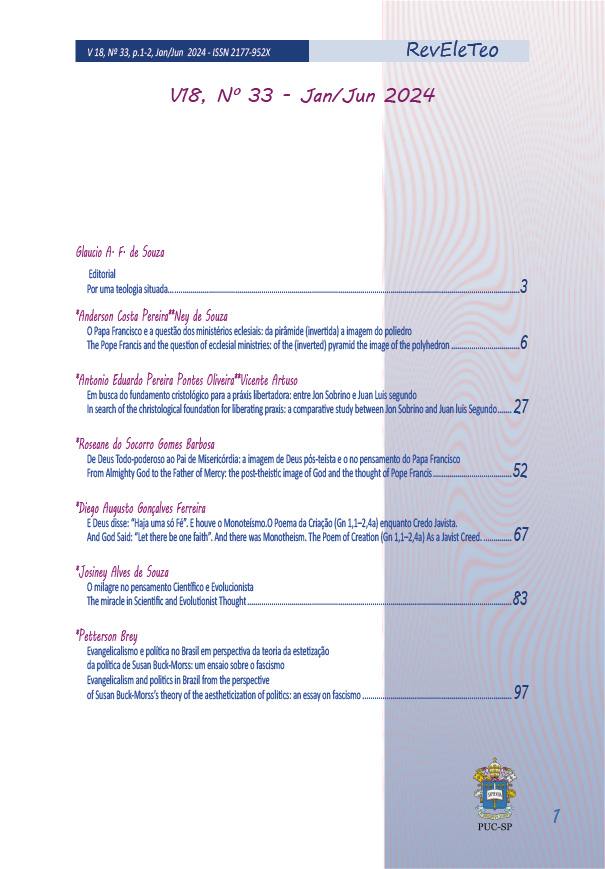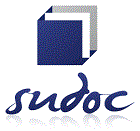And God Said: “Let there be one faith”. And there was Monotheism
The Poem of Creation (Gn 1,1–2,4a) As a Javist Creed
DOI:
https://doi.org/10.23925/2177-952X.2024v18i33p67-82Keywords:
Biblical Theology, Poem of Creation, Genesis, MonotheismAbstract
Faced with the mistaken scientific-literal interpretation of the first chapters of the book of Genesis, especially with regard to the narratives about the origin of the physical world and the human being, controversially identified with a creationist theory and opposed to evolutionism, the present article, entitled And God said: “Let there be one faith”. And there was monotheism, aiming to understand how the inaugural poem of the Bible constitutes a jahwist creed for the restoration of Israel’s monotheistic faith after the babylonian exile (587-538 BC). Affirming the final writing of the Torah in the post-exilic era, the research presents, in the topic And there was darkness, the babylonian polytheistic historical-cultural context that causes the composition of the Israelite account of Gn 1,1–2,4a; explores the content of the creation poem in parallel to the Babylonian narrative Enuma elish, on the topic And there was light; and notes, in the topic And God saw that it was good, the theological-monolatric nature of the biblical pericope investigated.
References
ALTER, R. A arte da narrativa bíblica. São Paulo: Companhia das Letras, 2007.
BÍBLIA DE JERUSALÉM. São Paulo: Paulus, 2001.
BRIGHT, J. História de Israel. São Paulo: Paulus, 2003.
BROWN, R. E. Novo comentário bíblico de São Jerônimo: Antigo Testamento. São Paulo: Ed. Academia Cristã Ltda; Paulus, 2007.
CAPPELLETTO, G. Genesi: capitoli 1–11. Padova: Edizioni Messaggero, 2000.
CARDOSO, C. F. S. Deuses, múmias e ziggurats: uma comparação das religiões antigas do Egito e da Mesopotâmia. Porto Alegre: EDIPUCRS, 1999.
CARREIRA, J. N. Estudos de cultura pré-clássica. Lisboa: Presença, 1985.
CARROLL, W. La creación y las ciencias naturales. Santiago: Edições Universidade Católica do Chile, 2003.
FREIRE-MAIA, N. Teoria da evolução de Darwin à teoria sintética. São Paulo: Editora Itatiaia/Editora da Universidade de São Paulo, 1988.
GARELLI, P.; NIKIPROWETZKY, V. O Oriente Próximo Asiático: impérios mesopotâmicos, Israel. São Paulo: Liv. Pioneira (Ed. da USP), 1982.
GASS, I. B. Uma introdução à Bíblia: exílio babilônico e dominação Persa. v. 5. São Paulo: Paulus; CEBI, 2007.
GAZZI, A. V. Introdução ao estudo do pentateuco. Santo André: Edição do Autor, 2013.
GRAY, J. Near eastern mythology. London: Hamlyn Publi. Group, 1975.
HOOKE, S. H. The middle eastern mythology. Harmondsworth: Penguin Books, 1985.
JAMES, E. O. El Templo: de la caverna a la catedral. Madrid: Ed. Guadarrama, 1966.
LA PENA, J. L. R. Teologia da criação. São Paulo: Loyola, 1989.
LEICK, G. Mesopotâmia: a invenção da cidade. Rios de Janeiro: Imago, 2003.
LIMA, C. P. Evolução biológica: controvérsias. São Paulo: Cultrix, 1988.
LÓPEZ, F. G. O pentateuco: introdução à leitura dos cinco primeiros livros da bíblia. São Paulo: Ave Maria, 2002.
MESTERS, C.; OROFINO, F. A Terra é nossa Mãe: Gênesis 1-12. São Leopoldo: CEB, 2007.
PURY, A. (Org.). O pentateuco em questão: as origens e a composição dos cinco primeiros livros da Bíblia à luz das pesquisas recentes. Petrópolis: Vozes, 1996.
REIMER, H. Monoteísmo e Identidade. Revista Eletrônica do Núcleo de Estudos e Pesquisa do Protestantismo (NEPP) da Escola Superior de Teologia. V. 16. Goiânia: 2008.
RENDTORFF, R. A História Bíblica das Origens (Gn 1–11) no contexto da Redação “Sacerdotal” do Pentateuco. In. PURY, A. (Org.). O pentateuco em questão: as origens e a composição dos cinco primeiros livros da Bíblia à luz das pesquisas recentes. Petrópolis: Vozes, 2002.
RUSE, M. The canonical hebrew Bible: a theology of the Old Testament. Leiden: Deo, 2005.
SKA, J. L. Introduzione alla Lettura del Pentateuco. Bologna: EDB, 2000.
WIÉNER, C. O Dêutero-Isaías: o profeta do novo êxodo. São Paulo: Paulinas, 1984.





